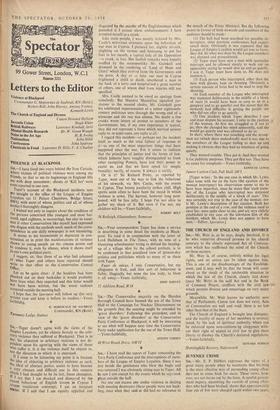S „.IR,—Taper doesn't agree with the views of the E mpire Loyalists,
yet he objects fiercely to the arbi- trary violence they suffered at Blackpool. That is to say, his objection to arbitrary violence is not de- pendent upon his agreeing with the views of those Who suffer it. It is the violence itself he objects to, not the direction in which it is exercised. If I seem to be labouring my point it is because tne idea of objecting to arbitrary violence as such, the ideal of abstract justice, seems to have become a , very obscure . and difficult one in this country nich I had thought to be its last, finest champion. I say that I am shocked and dismayed by the 'recent behaviour of English troops in Cyprus I arouse vociferous contempt; I am an incipient traitor. If I add that I am equally appalled and
disgusted by the murder of the Englishwoinan which preceded it I arouse silent embarrassment; I have revealed myself as a crank.
Like most people, I was mainly irritated by Mrs. Castle's notorious strictures upon thc behaviour of our men in Cyprus. I pictured her, slightly air-sick, alighting on the tarmac and hastening to put her foot in her mouth; a typical lady of the Opposition —a crank, in fact. Her foolish remarks were happily muffled by the statesmanlike Mr. Gaitskell and drowned in the rendering of 'Land of Hope and Glory' which they evoked from the Government and the press. A day or so later our men in Cyprus frightened a child to death, smothered a man in the back of a lorry and hospitalised a great number of others, one of whom died from injuries still not specified.
Mrs. Castle seemed to be owed an apology from somebody. But Maestro Macmillan signalled for- tissimo to the massed choirs, Mr. Gaitskell gave his celebrated impersonation of a minor eighteenth- century politician seen through the wrong end of a telescope and thb rest was silence. No doubt a few cranks wrote letters of protest to members of the Government, but, if my own experience is typical, they did not represent a force which merited serious reply or, in some cases, any reply at all.
I regard this incident—or perhaps not the incident itself so much as the total failure of response to it—as one of the most important things that have happened since the war. For it seems to indicate that the principles of justice and the forms of law, which hitherto have roughly distinguished us from other occupying Powers, have lost their power to excite us, and that we have opted for simple brutality; tacitly, of course; it always is tacitly.
Or is it? Sir Richard Proby, as reported by Taper, went out of his way to link the behaviour of his stewards, via Mrs. Castle, with the events in Cyprus. That breezy jocularity strikes chill. High spirits seem often to have been the mood in which violence is sown. The harvest, however long post- Paned, will be less jolly. I hope I'm not alive to gather my share of it. But even if I'm not, my children will be.—Yours faithfully,


































 Previous page
Previous page